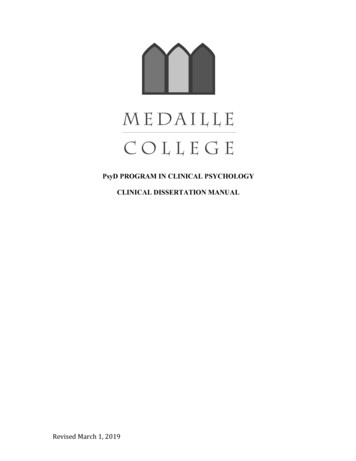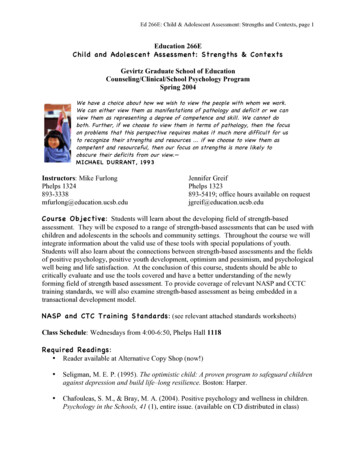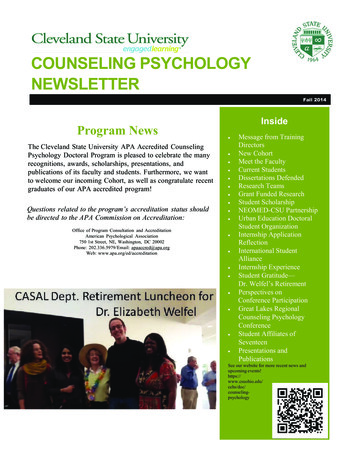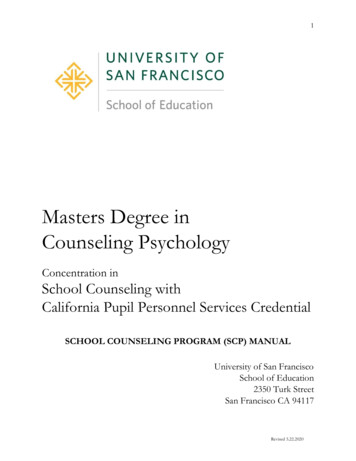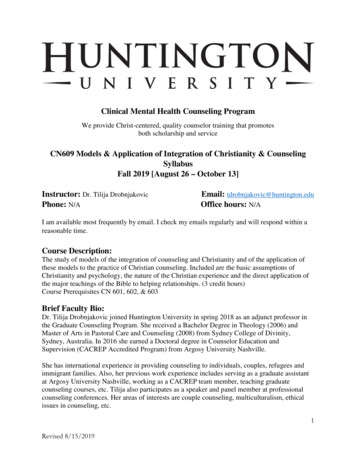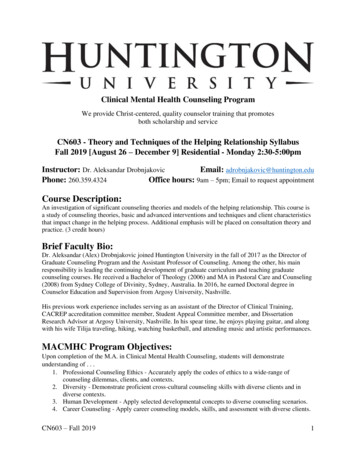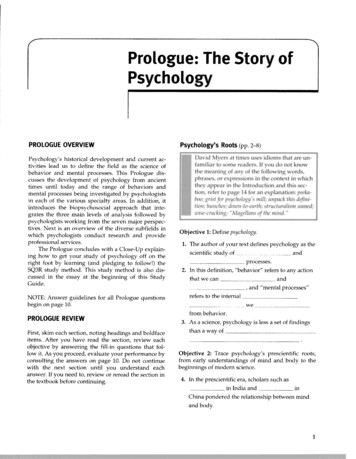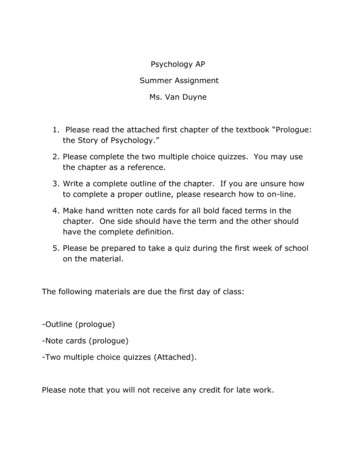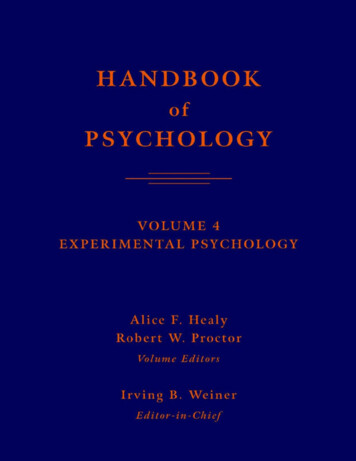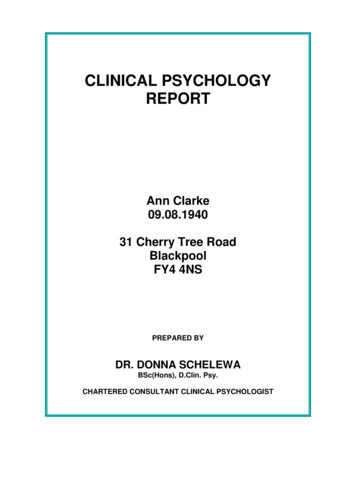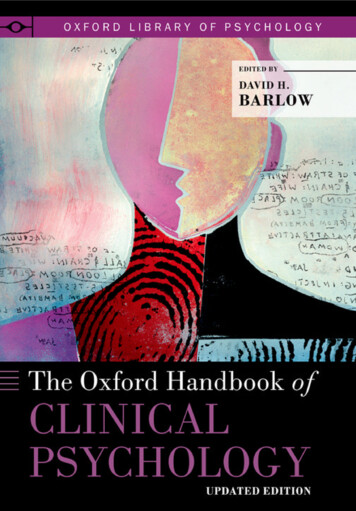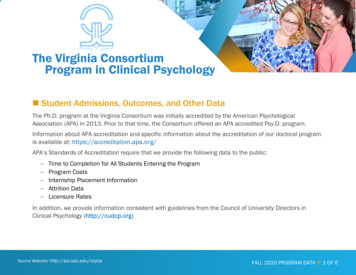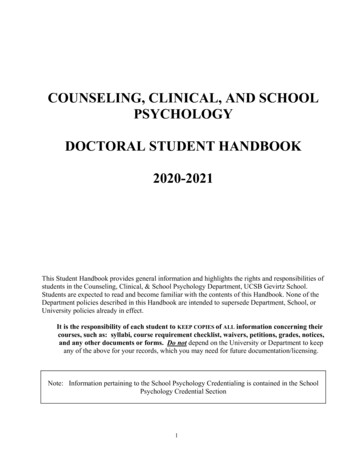
Transcription
COUNSELING, CLINICAL, AND SCHOOLPSYCHOLOGYDOCTORAL STUDENT HANDBOOK2020-2021This Student Handbook provides general information and highlights the rights and responsibilities ofstudents in the Counseling, Clinical, & School Psychology Department, UCSB Gevirtz School.Students are expected to read and become familiar with the contents of this Handbook. None of theDepartment policies described in this Handbook are intended to supersede Department, School, orUniversity policies already in effect.It is the responsibility of each student to KEEP COPIES of ALL information concerning theircourses, such as: syllabi, course requirement checklist, waivers, petitions, grades, notices,and any other documents or forms. Do not depend on the University or Department to keepany of the above for your records, which you may need for future documentation/licensing.Note: Information pertaining to the School Psychology Credentialing is contained in the SchoolPsychology Credential Section1
TABLE OF CONTENTSINTRODUCTION. .4CCSP Program History . 4Accreditation . 4CCSP DEPARTMENT MISSION, GOALS, AND VALUES .5CCSP Department Mission . 5CCSP Doctoral Program Competencies . 5CCSP Department Goals . 7CCSP Values and Philosophy . 8Commitment to Empirical Knowledge and Professional Competency . 11Commitment to Ethical Research and Practice . 11DEPARTMENT POLICY FOR THE EVALUATION OF STUDENTS .11PROCEDURES OF COMPLAINT . 12CCSP SOCIAL MEDIA POLICY .13CCSP DEPARTMENT FACULTY .15DEPARTMENT ADVISING AND COMMITTEE MEMBERSHIP .17Faculty Advisor and Committee Members . 18Changing Advisors . 18Changing Emphasis . 19Petitioning to Add the M.A. or M.Ed. . 19Student Records .19DOCTORAL DEGREE REQUIREMENTS .19Normal Progress . 19Good Standing . 20Prerequisites . 20Required Courses . 20Course Substitution / Waiver Policy . . .20Knowledge, Skills, Ethics, Communication & Interpersonal Abilities . 212
Practicum (See PhD Coursework) . 21Pre-Dissertation Research Project . 22Qualifying Examination (Also see section titled Qualifying Exams/Dissertation) . 22Dissertation Research 23Internship 23Internship Application Process .23Licensing . . 24DEPARTMENT LEADERSHIP AND COMMITTEES . 25Student Representatives . 25Standing Committees .25FINANCIAL AID .26Intramural Sources .26Fellowships . .27Extramural Sources 27GENERAL INFORMATION . 28Associate Dean, Student Affairs Office, and Student Affairs Committee for the GGSE .28Student Study Space and Computer Access . .28Graduate Student Handbook . 29Gevirtz Graduate School of Education Web Site 29Prospective Students .29UCSB Letterhead 29Fax Machine 29Flyers and Bulletins 293
INTRODUCTIONCCSP PROGRAM HISTORYThe training of professional psychologists at the University of California Santa Barbara (UCSB)began in 1969 with the appointment of Dr. Ray E. Hosford. Since that time, the department hasexperienced expansion and enhancements. The original faculty in 1969 consisted of twoprofessors; the current Department has a faculty of 16 The original Ph.D. was in Education andwas changed in 1987 to a Ph.D. in Counseling Psychology. Effective Fall 1990, students wereoffered three specializations—counseling, clinical, or school psychology—reflecting thepopulations and skills to which the respective areas devote their professional activities. As of1991, the degree awarded by the University of California for successful completion of thiscombined program is in “Counseling, Clinical, & School Psychology” (CCSP). One of the threeprogram specialties (counseling, clinical, or school) is also designated on each student’s officialUniversity transcript. In 2006, the Department of Counseling, Clinical, and School Psychologywas established within the Gevirtz Graduate School of Education.The UCSB CCSP Department has received national recognition and has enhanced the breadthand depth of its offerings through selective and successful recruitment of high quality faculty.Graduates of the Department have found employment in academic departments as well as inmental health settings, counseling centers, and public schools.ACCREDITATIONThree external bodies provide criteria for training programs in applied psychology, in addition tothe general accreditation provided to the University by state and regional educational agencies.Psychology programs that train individuals to provide direct services to the public must complywith requirements sufficiently to ensure that graduating students meet the educational standardsfor licensure. (However, the CCSP department does meet unique requirements of all 50 USAstates, but provides a core of curriculum that goes towards meeting requirements. Studentsshould inform themselves of specific state licensure requirements prior to enrolling at UCSB.)Moreover, to enhance student's flexibility in the job market, voluntary accreditation by theAmerican Psychological Association is deemed necessary by the department.Four types of programs are accredited by the Commission on Accreditation of the AmericanPsychological Association (APA): Counseling, Clinical, School, and Combined ScientificProfessional Psychology (our program is Combined). The UCSB program first receivedaccreditation from APA as a Counseling Psychology program in 1981. In 1986, and again in1988, site visit teams from the Committee on Accreditation of APA re-accredited the program inthe same specialty area. In 1990, the Department also received a three-year provisionalaccreditation for the combined program (for students entering the Department in September,1991 or later). In 1994, APA gave five years full accreditation to the combined CCSPDepartment. In 2006 and 2013, APA conducted subsequent site reviews and in each case, CCSPreceived full seven-year accreditation.Finally, the California Commission on Teacher Credentialing accredits units that offer state-levelcredentials for practice in the schools. Our School Psychology Specialization offers a pupilpersonnel services credential in school psychology. The specialization is approved by theNational Association of School Psychologists.4
CCSP DEPARTMENT MISSIONTo generate and disseminate knowledge, provide expertise, and prepare the next generation ofdiverse scholars in applied psychology. The Department of CCSP strives to be recognized forexcellence and innovation in research that fosters the psychological well-being and social equityof all people, especially vulnerable populations.CCSP PH.D. PROGRAM COMPETENCIES1. ResearchBy the time they graduate, students will be expected to: Demonstrate the substantially independent ability to formulate research or otherscholarly activities (e.g., critical literature reviews, dissertation, efficacy studies,clinical case studies, theoretical papers, program evaluation projects, programdevelopment projects) that are of sufficient quality and rigor to have the potential tocontribute to the scientific, psychological, or professional knowledge base.Conduct research or other scholarly activities.Critically evaluate and disseminate research or other scholarly activity viaprofessional publication and presentation at the local (including the host institution),regional, or national level.2. Ethical and legal standardsStudents are expected to: Be knowledgeable of and act in accordance with the current version of the APAEthical Principles of Psychologists and Code of Conduct, relevant laws, regulations,rules, and policies governing health service psychology at the organizational, local,state, regional, and federal levels, and relevant professional standards and guidelines.Recognize ethical dilemmas as they arise, and apply ethical decision-makingprocesses in order to resolve the dilemmas.Conduct themselves in an ethical manner in all professional activities.3. Individual and cultural diversityBy the time they graduate, students are expected to demonstrate: An understanding of how their own personal/cultural history, attitudes, and biasesmay affect how they understand and interact with people different from themselves.Knowledge of the current theoretical and empirical knowledge base as it relates toaddressing diversity in all professional activities including research, training,supervision/consultation, and service.5
4.The ability to integrate awareness and knowledge of individual and culturaldifferences in the conduct of professional roles (e.g., research, services, and otherprofessional activities). This includes the ability apply a framework for workingeffectively with areas of individual and cultural diversity not previously encounteredover the course of their careers. Also included is the ability to work effectively withindividuals whose group membership, demographic characteristics, or worldviewscreate conflict with their own.Demonstrate the requisite knowledge base, ability to articulate an approach toworking effectively with diverse individuals and groups, and apply this approacheffectively in their professional work.Professional values, attitudes, and behaviorsStudents are expected to: Behave in ways that reflect the values and attitudes of psychology, includingintegrity, deportment, professional identity, accountability, lifelong learning, andconcern for the welfare of othersEngage in self-reflection regarding one’s personal and professional functioning;engage in activities to maintain and improve performance, well-being, andprofessional effectiveness.Actively seek and demonstrate openness and responsiveness to feedback andsupervision.Respond professionally in increasingly complex situations with a greater degree ofindependence as they progress across levels of training.5. Communications and interpersonal skillsBy the time they graduate, students are expected to: Develop and maintain effective relationships with a wide range of individuals,including colleagues, communities, organizations, supervisors, supervisees, and thosereceiving professional services.Produce and comprehend oral, nonverbal, and written communications that areinformative and well-integrated; demonstrate a thorough grasp of professionallanguage and concepts.Demonstrate effective interpersonal skills and the ability to manage difficultcommunication well.6. AssessmentBy the time they graduate, students are expected to: Select and apply assessment methods that draw from the best available empiricalliterature and that reflect the science of measurement and psychometrics; collectrelevant data using multiple sources and methods appropriate to the identified goals6
and questions of the assessment as well as relevant diversity characteristics of theservice recipient.Interpret assessment results, following current research and professional standardsand guidelines, to inform case conceptualization, classification, andrecommendations, while guarding against decision-making biases, distinguishing theaspects of assessment that are subjective from those that are objective.Communicate orally and in written documents the findings and implications of theassessment in an accurate and effective manner sensitive to a range of audiences.7. InterventionBy the time they graduate, students are expected to: Establish and maintain effective relationships with the recipients of psychologicalservices.Develop evidence-based intervention plans specific to the service delivery goals.Implement interventions informed by the current scientific literature, assessmentfindings, diversity characteristics, and contextual variables.Demonstrate the ability to apply the relevant research literature to clinical decisionmaking.Modify and adapt evidence-based approaches effectively when a clear evidence-baseis lacking.Evaluate intervention effectiveness, and adapt intervention goals and methodsconsistent with ongoing evaluation.8. SupervisionBy the time they graduate, students are expected to: Demonstrate knowledge of supervision models and practices.9. ConsultationBy the time they graduate, students are expected to: Demonstrate knowledge of consultation models and practices. Demonstrate knowledge and respect for the roles and perspectives of otherprofessions10. TeachingBy the time they graduate, students are expected to: Demonstrate knowledge of pedagogy models and practices.CCSP DEPARTMENT GOALSThe CCSP Department follows the scientist-practitioner training model with its emphasis ondeveloping a balance of research, academic, and practitioner knowledge and skills. In additionto enrolling in academic and professional seminars, students complete both research and appliedpsychology practica.7
The primary goal of the CCSP Department is to prepare graduates for academic and researchpositions. When graduates do not enter academic or research positions, our goal is to preparepsychological service providers who will influence professional psychology through teaching,research, and leadership.The three specializations of counseling, clinical, and school psychology historically havereflected different service emphases, employment settings, and populations served. Counselingpsychologists have traditionally focused on life-adjustment problems and career developmentand have worked primarily in university counseling centers, Veterans Administration hospitals,and community agencies. Clinical psychologists have traditionally focused on the evaluation,prevention, and treatment of clients with acute or chronic mental disorders and have worked inmedical settings, mental health centers, mental hospitals, and psychiatric units of generalhospitals. School psychologists have traditionally focused on the evaluation and treatment ofyouth with developmental problems, work to help improve the quality of school’s learningenvironments, and have been employed primarily in school settings. However, theinterdependence of contemporary social systems currently requires that psychologists have abroad knowledge of service emphases, employment settings, and client populations. Forexample, counseling psychologists need to be familiar with the diagnostic procedures andprinciples of psychopathology, clinical psychologists need to be familiar with the influences andworkings of school systems and patterns of normal development, and school psychologists needto be familiar with family and organizational systems.In order to develop research-oriented, academic psychologists who can adapt to changing anddiversifying roles, the CCSP Department requires all doctoral students take core courses thatprovide education in: (a) awareness, knowledge, and skills that are common to counseling,clinical, and school psychology; and (b) exposure to the knowledge unique to counseling,clinical, and school psychology. Beyond the entry-level awareness and knowledge base taughtin the common core courses, students receive specialized training in counseling, clinical, orschool psychology to prepare them to meet the needs of the populations and settings served bythe specialty they each have chosen. This goal is accomplished through separate researchpractica, clinical practica, coursework, and internships.The organizing themes that integrate the identity of the CCSP Department are: (a) the values ofhuman diversity and individual differences; (b) health and development across the lifespan; and(c) ecological (e.g., family, school, community) influences on human behavior.CCSP VALUES AND PHILOSOPHYThe values and philosophy that guide the instructional priorities and the curriculum of the CCSPDepartment are derived from four documents: (a) the Master Plan of the State of California; (b)the Graduate School of Education Mission Statement; (c) the University of California, FacultyHandbook; and (d) the Ethical Principles of Psychologists and Code of Conduct of the AmericanPsychological Association (APA) and the CCSP Mission Statement. The first and second ofthese documents define the general mission and goals of the University of California and of theunit in which the CCSP Department functions. The third, fourth and fifth documents define the8
values and behaviors that are expected of faculty, students, and staff within the CCSPDepartment in the performance of scholastic and professional roles, respectively.The California Master Plan designates and defines the missions of the higher education systemswithin the State. The three components of the higher education system are organized in acoordinated fashion in which each is to carry out a different educational mission and to beaccessible by a different segment of California high school graduates. Together, the CityCollege System and the California State University campuses are committed to ensuring that allh
DOCTORAL STUDENT HANDBOOK 2020-2021 This Student Handbook provides general information and highlights the rights and responsibilities of students in the Counseling, Clinical, & School Psychology Department, UCSB Gevirtz School. Students are expected to read and become
